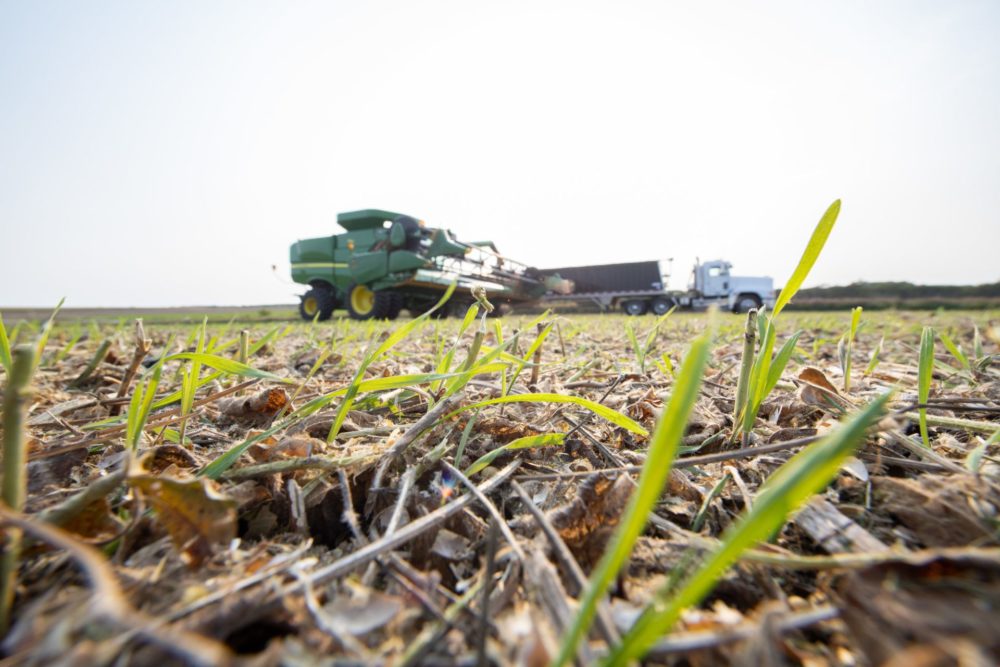Earlier this year, AFN compiled a list of climate commitments from agrifood corporates in an effort to keep track of and hold businesses accountable to these promises. Increasingly, these include regenerative agriculture commitments.
Regenerative agriculture isn’t new — indigenous populations have used it for millennia, and modern-day farmers in industrialized countries have been attaching the word “regenerative” to their farming practices since the mid-20th century.
What is new is major corporations putting resources towards implementing regenerative agriculture in their own supply chains en masse. From agrifood mega-company Cargill to the world’s major beer-makers, companies are currently working with their farming partners to leverage cover-cropping, rotational grazing, and other regenerative agriculture practices that aim to restore soil health, increase biodiversity and have the potential to pull carbon out of the air and store it in the ground.
One complication is that regenerative agriculture has no one set definition. A good general one to go by is from the journal reNature, which stated last year that “regenerative agriculture aims at regenerating, renewing and further improving the soil functions and capabilities for ecosystem services in an always-improving process.” In other words, it’s not enough to just sustain our existing soil; we need to improve soil health by promoting the bacteria, fungi, and other soil microbes living in it so that they can better nourish plants growing out of it. This can improve crop yields and quality as well as regenerate degraded lands providing more farmable land to feed a growing population. It could also help reverse climate change as a carbon sink; healthier, less disturbed soils can store more carbon.
With industrial ag mostly an extractive industry and in some cases the antithesis of the above through the overapplication of chemical pesticides and synthetic fertilizers that drain the soil of its nutrients, major agribusiness corporates have announced that they are now working with their farmers to transition them to regenerative practices such as cover cropping, no-till, and eliminating the use of artificial fertilizers and pesticides.
In an effort to ensure these announcements are not greenwashing, AFN has put together a list of corporate regenerative agriculture commitments.
The list varies considerably in terms of timeframes and specific actions from agrifood players. Some companies, like General Mills, have a specific amount of acreage to which they will apply regenerative agriculture practices by a specific date. Others use more vague language, packing regen ag into their larger emissions reductions goals. Most of these commitments are recent; all of them offer some optimism flavored with a strong dose of reality around how complex this transition is for farmers and corporates alike.
We expect the list of commitments to grow substantially throughout the rest of the year and will be updating this post regularly. We have also chosen to focus mainly on soil health here, though there could be more specific commitments to other regenerative practices around livestock management, dairy production, reforestation.
This list is unlikely exhaustive. We welcome suggestions of agrifood corporate climate commitments we may have missed or not yet heard about. Send me a note here.
Agrifood Corporate Regenerative Agriculture Commitments
| Company | Commitment |
First announced
|
| Anheuser-Busch | Invest in “smart agriculture” that promotes regen practices | 2020 |
| Ardent Mills | By 2022: Enroll 250,000 acres of spring and winter wheat into its regenerative agriculture program; advance regen ag practices over the next three years | 2021 |
| Cargill | By 2030: Transfer 10 million acres of North American farmland to regen ag | 2020 |
| Danone | By 2025: Source 100% of ingredients in France from regen ag | 2018 |
| Diageo | Three-year regenerative agriculture program aimed cutting carbon emissions from Guinness barley production in Ireland | 2022 |
| Fresh Del Monte | By 2030: Implement regenerative and soil health management practices in 100% of owned and associated farms; Increase cover cropping on supplier farms 5% per year | 2020 |
| General Mills | By 2030: Apply regenerative agriculture to 1 million acres | 2019 |
| Heinekin | Exploring sustainable barley production on 7,000 acres of winter and spring barley varieties | 2021 |
| Horizon Organic | By 2025: carbon positive through regen ag practices | |
| Hormel | Applegate brand to transition up to 260,000 acres of U.S. grasslands via its DO GOOD DOG | 2019 |
| Keurig Dr. Pepper | By 2020: support regenerative agriculture and conservation on 250,000 acres of land | 2021 |
| Knorrr | By 2025: Launch 50 regenerative ag projects to reduce GHGs of key ingredients by 30% | 2021 |
| Land O’ Lakes | Transition farmers to regen ag via Truterra program | 2016 |
| Mars | Part of overall plant to be net zero by 2050 | 2021 |
| Molson-Coors |
By 2025: Source 100% of agricultural brewing ingredients from suppliers who grow, produce and deliver “sustainably”
|
|
| Nestlé | By 2030: Implement regen practices across supply chain | 2021 |
| Pepsi | By 2030: Scale regenerative farming practices across 7 million acres | 2021 |
| Pernod Ricard | By 2025: Pilot regen ag projects within eight of its wine-growing regions; 2030 have at least 5,000 farmers transitioning to regen ag | 2021 |
| Smithfield Foods | Source at least 75% of grain grown in US with efficient fertilizer and soil health practices | 2020 |
| Target | By 2025: Leverage soil health practices to improve at least 1 million acres of land | 2020 |
| Unilever | By 2030: Regenerate 1.5 million hectares of land, forests and oceans | 2020 |
| Walmart | By 2030: Restore at least 50 million acres of land | 2021 |





